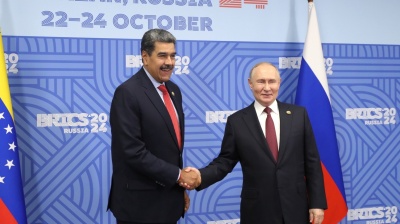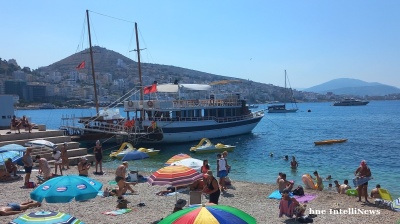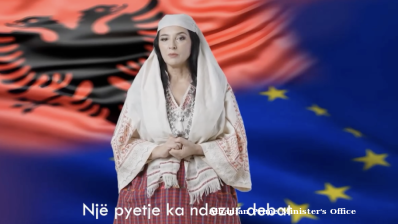Ministers from across the European Union discussed issues related to enlarging the bloc to potentially include up to eight additional countries at a meeting in the Spanish city of Murcia on September 28.
The meeting of EU general affairs ministers took place shortly after France and Germany put forward an expert paper calling for a comprehensive overhaul of the EU's decision-making processes and financial structures if the bloc intends to admit additional member countries by 2030.
To enable enlargement of the bloc from the current 27 members, substantial changes are needed to decision-making processes, agricultural policies and regional aid budgets, the paper argues.
The meeting in Murcia, organised by the Spanish EU Council presidency, was intended to prepare for the summit of the European Political Community (EPC) on October 5 and the EU Council summit on October 6.
At the meeting, ministers discussed the budgetary implications of enlarging the EU to more than 30 — or potentially more than 35 — member states and the institutional reforms that would be necessary, a statement from the Spanish EU Council presidency said. Also discussed was the concept of Open Strategic Autonomy, namely ensuring the capacity to cope alone if necessary but without ruling out cooperation whenever possible.
Spain’s acting Minister of Foreign Affairs, European Union and Cooperation José Manuel Albares said that many states want to be part of the EU because they share the same values and aspirations. The meeting "has made progress on the new strategic agenda of the European Union, which will be approved next year and which supports and is supported by enlargement and Open Strategic Autonomy,” Albares added.
“[EU] reform & [EU] enlargement have to go hand in hand,” wrote Germany's Europe Minister Anna Luhrmann on the X social media platform (formerly Twitter).
“While candidate countries need to prepare, we have to do our homework as well. Looking forward to fruitful debates on how to ensure our capability to act, to protect rule of law and to engage citizens in a bigger EU,” Luhrmann added.
Enlargement progress
There are currently eight countries with EU accession candidate status: five of the six Western Balkan states — Albania, Bosnia & Herzegovina, Montenegro, North Macedonia and Serbia — as well as Moldova, Turkey and Ukraine. Georgia and Kosovo are potential candidate states.
There has been growing frustration among the accession candidates from the Western Balkans in recent years because of the slow pace of enlargement; no new country has joined the EU since Croatia in 2013.
However, following Russia’s invasion of Ukraine there has been a new emphasis on enlargement. That resulted in Moldova, Ukraine and later Bosnia being given candidate status, while Albania and North Macedonia were given the go ahead to start accession negotiations in 2022.
“A Europe that is expanding, strengthening and can play on an equal footing with other powers in an unstable world. This is the challenge of the next decade,” commented French Europe Minister Laurence Boone on X.
EU Enlargement Commissioner Várhlyi said the meeting had "analysed ways of speeding up enlargement”. He commented that "the most important thing at the moment is to put all the tools on the table to speed up accessions" and said the EU Council "has to be ready to admit new members before 2030”.
Várhlyi plans to present a package “which will include ten candidate countries or countries with the prospect of accession" within the coming weeks.
Internal reforms needed
2030 has been put forward as a potential target date for accession, but influential politicians including French President Emmanuel Macron have stressed the need for internal reforms to the EU before that takes place.
The decision-making process in particular may be changed, as currently unanimity is required for decisions on important issues such as foreign and security policy and taxation. As the bloc expands, however, the unanimity requirement is perceived as potentially hindering or even obstructing the progress of the EU.
Another area where change may be required is agriculture, given Ukraine’s importance as an agricultural producer. Letting Ukraine into the EU would require substantial alterations to the current system of direct payments to farmers.
Similarly, the EU's regional policy, which currently allocates funding to support the development of less affluent EU member states, would need to be altered.
The Franco-German document, put forward for an initial discussion on September 19, proposed allowing certain EU countries to engage in varying degrees of cooperation, effectively creating four tiers of European integration.
The deepest level of integration would comprise an inner circle akin to the eurozone, where member states use the single currency and are members of the passport-free Schengen travel zone.
The second tier would encompass the broader EU, while a larger circle beyond that would consist of associate members. These associate members would take part in the EU's single market for goods and services and uphold the EU's common principles.
Lastly, there would be the European Political Community that would serve as an outer tier for political cooperation, but whose members are not bound by EU law.
News

Ukraine’s elite HUR forces turn the tide in the battle for Pokrovsk, as Russia’s effort to capture key logistics hub fails
The battle for Pokrovsk became intense early on November 1and it looked like the fall of the key logistics hub to Russia was imminent. But a bold counterattack by Ukraine’s elite HUR forces seems to have turned the tide.

US prepares attack on Venezuela as Maduro begs Putin for aid
The Trump administration has reportedly drawn up a list of potential military targets within Venezuela as part of its intensifying pressure on President Nicolás Maduro, who has turned to Moscow seeking urgent military assistance.

Bulgaria suspends fuel exports to EU after US sanctions Lukoil
Bulgaria has temporarily suspended exports of petroleum products to European Union countries after the United States imposed sanctions on Russian oil giant Lukoil.

Tens of thousands rally in Serbia's Novi Sad one year after deadly station collapse
Tragedy that killed 16 people has become a symbol of public anger over corruption and negligence, fueling Serbia’s largest protest movement in more than a decade.




